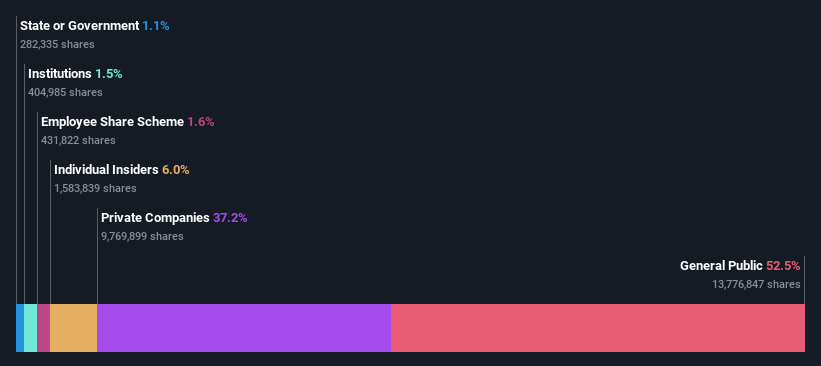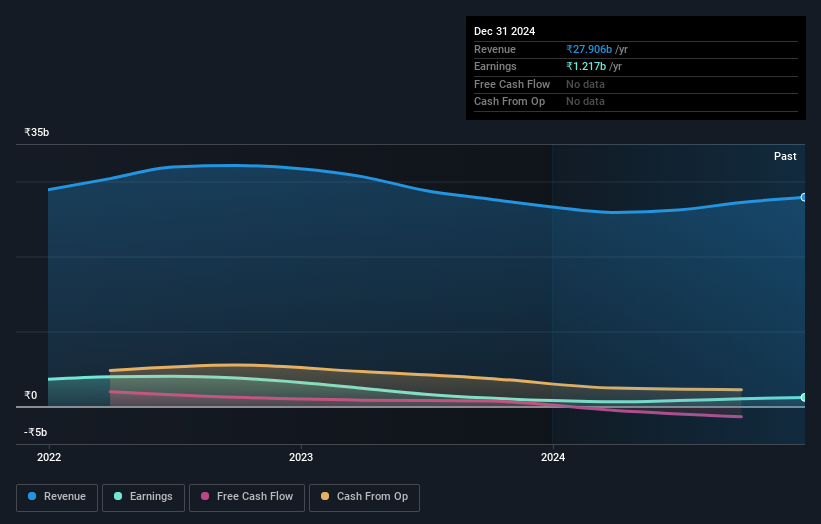Individual investors invested in Cosmo First Limited (NSE:COSMOFIRST) copped the brunt of last week's ₹2.0b market cap decline
Key Insights
- Significant control over Cosmo First by individual investors implies that the general public has more power to influence management and governance-related decisions
- 48% of the business is held by the top 24 shareholders
- Past performance of a company along with ownership data serve to give a strong idea about prospects for a business
If you want to know who really controls Cosmo First Limited (NSE:COSMOFIRST), then you'll have to look at the makeup of its share registry. And the group that holds the biggest piece of the pie are individual investors with 52% ownership. That is, the group stands to benefit the most if the stock rises (or lose the most if there is a downturn).
As a result, individual investors as a group endured the highest losses last week after market cap fell by ₹2.0b.
In the chart below, we zoom in on the different ownership groups of Cosmo First.
See our latest analysis for Cosmo First

What Does The Institutional Ownership Tell Us About Cosmo First?
Institutional investors commonly compare their own returns to the returns of a commonly followed index. So they generally do consider buying larger companies that are included in the relevant benchmark index.
Less than 5% of Cosmo First is held by institutional investors. This suggests that some funds have the company in their sights, but many have not yet bought shares in it. If the company is growing earnings, that may indicate that it is just beginning to catch the attention of these deep-pocketed investors. We sometimes see a rising share price when a few big institutions want to buy a certain stock at the same time. The history of earnings and revenue, which you can see below, could be helpful in considering if more institutional investors will want the stock. Of course, there are plenty of other factors to consider, too.

Hedge funds don't have many shares in Cosmo First. The company's largest shareholder is Ashok Jaipuria Private Trust, with ownership of 36%. For context, the second largest shareholder holds about 3.8% of the shares outstanding, followed by an ownership of 1.6% by the third-largest shareholder. Ashok Jaipuria, who is the second-largest shareholder, also happens to hold the title of Top Key Executive. Furthermore, CEO Pankaj Poddar is the owner of 0.5% of the company's shares.
A deeper look at our ownership data shows that the top 24 shareholders collectively hold less than half of the register, suggesting a large group of small holders where no single shareholder has a majority.
Researching institutional ownership is a good way to gauge and filter a stock's expected performance. The same can be achieved by studying analyst sentiments. As far as we can tell there isn't analyst coverage of the company, so it is probably flying under the radar.
Insider Ownership Of Cosmo First
While the precise definition of an insider can be subjective, almost everyone considers board members to be insiders. Company management run the business, but the CEO will answer to the board, even if he or she is a member of it.
Insider ownership is positive when it signals leadership are thinking like the true owners of the company. However, high insider ownership can also give immense power to a small group within the company. This can be negative in some circumstances.
We can see that insiders own shares in Cosmo First Limited. As individuals, the insiders collectively own ₹852m worth of the ₹14b company. This shows at least some alignment, but we usually like to see larger insider holdings. You can click here to see if those insiders have been buying or selling.
General Public Ownership
The general public, who are usually individual investors, hold a substantial 52% stake in Cosmo First, suggesting it is a fairly popular stock. This size of ownership gives investors from the general public some collective power. They can and probably do influence decisions on executive compensation, dividend policies and proposed business acquisitions.
Private Company Ownership
We can see that Private Companies own 37%, of the shares on issue. Private companies may be related parties. Sometimes insiders have an interest in a public company through a holding in a private company, rather than in their own capacity as an individual. While it's hard to draw any broad stroke conclusions, it is worth noting as an area for further research.
Next Steps:
I find it very interesting to look at who exactly owns a company. But to truly gain insight, we need to consider other information, too. Take risks for example - Cosmo First has 4 warning signs (and 2 which are a bit concerning) we think you should know about.
Of course this may not be the best stock to buy. So take a peek at this free free list of interesting companies.
NB: Figures in this article are calculated using data from the last twelve months, which refer to the 12-month period ending on the last date of the month the financial statement is dated. This may not be consistent with full year annual report figures.
New: AI Stock Screener & Alerts
Our new AI Stock Screener scans the market every day to uncover opportunities.
• Dividend Powerhouses (3%+ Yield)
• Undervalued Small Caps with Insider Buying
• High growth Tech and AI Companies
Or build your own from over 50 metrics.
Have feedback on this article? Concerned about the content? Get in touch with us directly. Alternatively, email editorial-team (at) simplywallst.com.
This article by Simply Wall St is general in nature. We provide commentary based on historical data and analyst forecasts only using an unbiased methodology and our articles are not intended to be financial advice. It does not constitute a recommendation to buy or sell any stock, and does not take account of your objectives, or your financial situation. We aim to bring you long-term focused analysis driven by fundamental data. Note that our analysis may not factor in the latest price-sensitive company announcements or qualitative material. Simply Wall St has no position in any stocks mentioned.
About NSEI:COSMOFIRST
Cosmo First
Engages in the manufacture and sale of bi-axially oriented polypropylene (BOPP) films in India and Internationally.
Slight risk with acceptable track record.
Market Insights
Community Narratives



